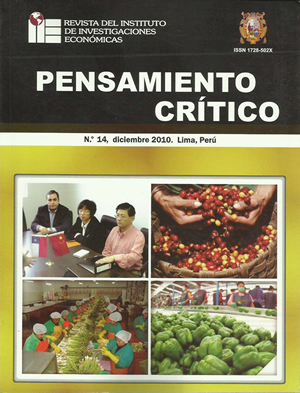La institucionalización nacional como estrategia para enfrentar los cambios sociales por la globalización y la sostenibilidad del modelo económico
DOI:
https://doi.org/10.15381/pc.v14i0.9091Keywords:
Globalization, market, credit, global imbalances, institutionalization, empowerment, inclusion.Abstract
It is undeniable that the globalization trend is irreversible. Today, access to economic development is unthinkable without being able to participate in global trade, especially trade with all countries and in all fields is possible and desirable. In this paper, we analyzes and propose some answers about the demand of 30% of the electorate in the recent Peruvian presidential elections who called for a “radical change”, despite substantial and sustained economic growth in the 10 years, with unprecedent progress in reducing poverty but modest reduction in income inequality. The analysis is reviewed within a general framework for globalization in which Peru is actively involved and we see the importance in this process of trade and integration in the market, consumption and credit. It is stressed the effect of the current “unregulated” global monetary system which encourages global imbalances, generating new structural trends in society and their implications for our society in particular. We conclude that, given the persistent problems of wealth redistribution that creates dissatisfaction of citizens, to achieve democratic stability and continuity of the economic model it is necessary to improve deliberative spaces and empower citizens, especially the poorest ones, in the model of growth in globalization, highlighting as a key strategy the national institutionalization process for the construction of a project country.Downloads
Published
Issue
Section
License
Copyright (c) 2010 Jorge Barrera Herrera

This work is licensed under a Creative Commons Attribution-NonCommercial-ShareAlike 4.0 International License.
THE AUTHORS RETAIN THEIR RIGHTS:
a. The authors retain their trademark and patent rights, and also on any process or procedure described in the article.
b. The authors retain the right to share, copy, distribute, execute and publicly communicate the article published in Pensamiento Crítico (for example, place it in an institutional repository or publish it in a book), with recognition of its initial publication in Pensamiento Crítico.
c. The authors retain the right to make a subsequent publication of their work, to use the article or any part of it (for example: a compilation of their works, notes for conferences, thesis, or for a book), provided they indicate the source of publication (authors of the work, journal, volume, number and date).






